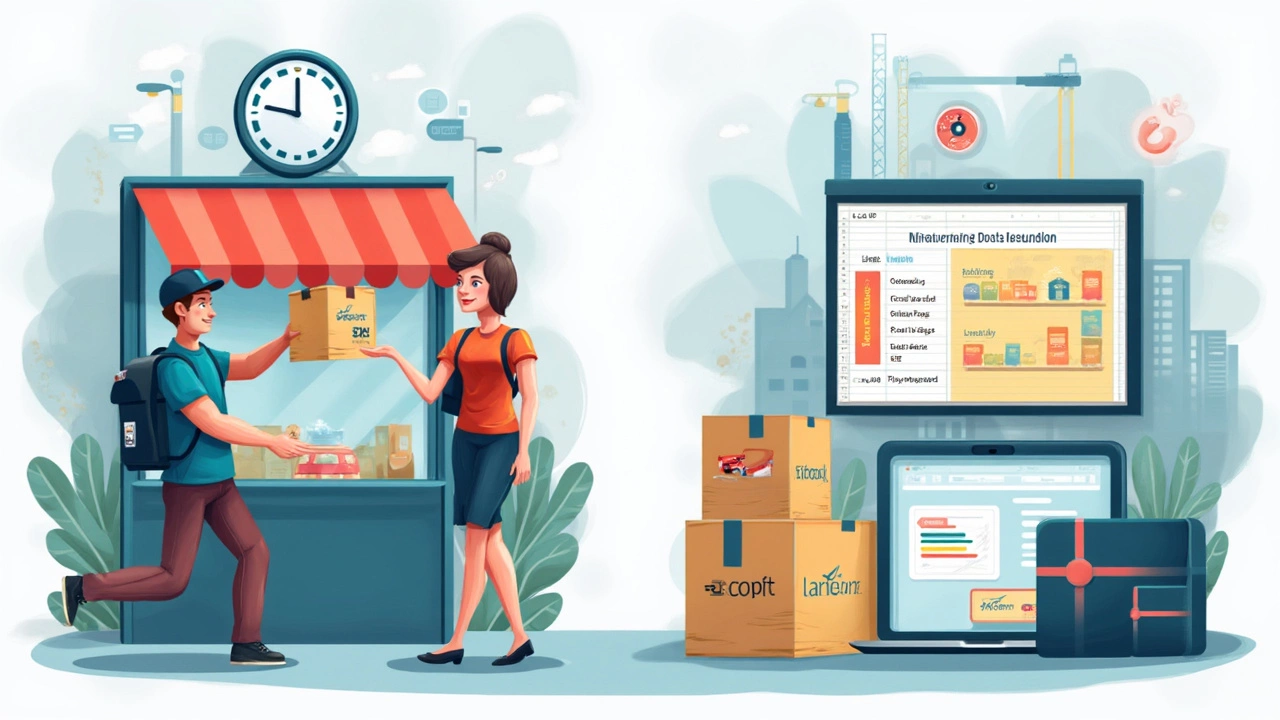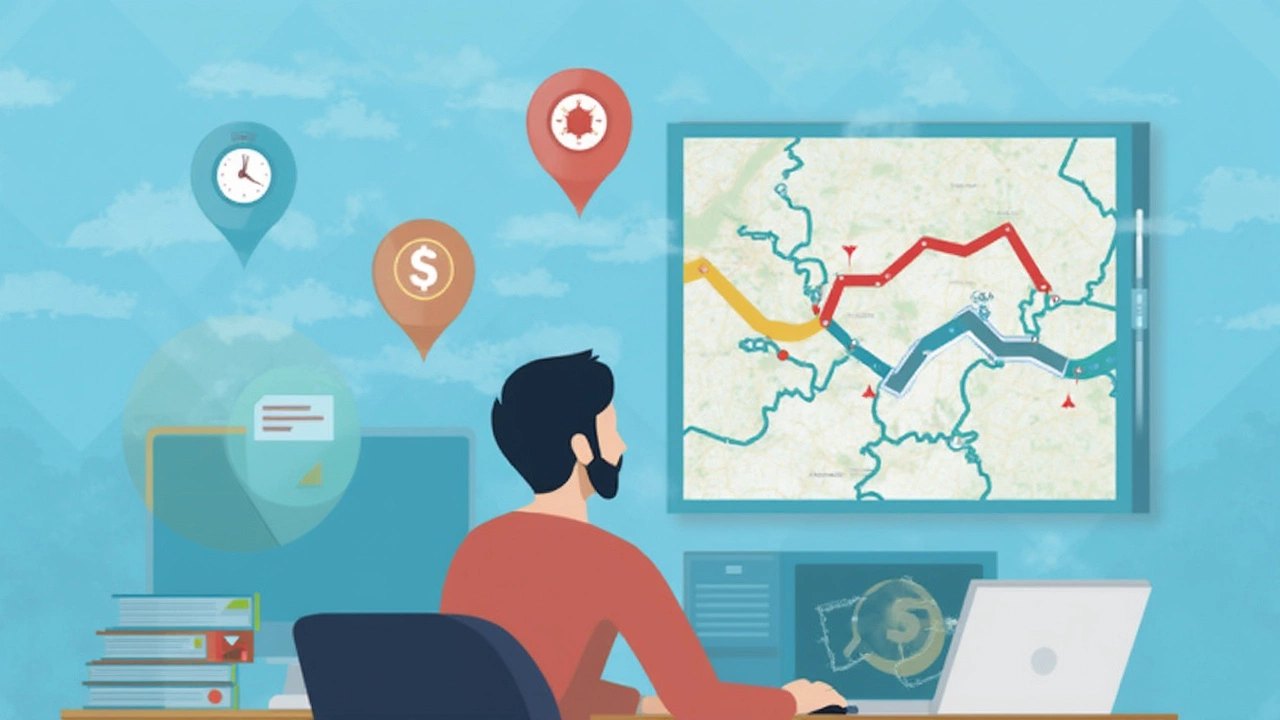Nobody cares about glamorous branding when your shipment goes missing or lands late. That’s why finding the best logistics company is bigger than just going with a name you’ve heard on a truck or a shipping label. The real challenge? Every business, and even every regular person just sending a package, wants something different—speed, price, tracking, or white-glove service.
I remember trying to get a last-minute birthday gift out to my kid, Quentin, and watching three different tracking systems show three very different locations for one tiny box. It’s messy, and a lot of people just cross their fingers and hope for the best. But you don’t have to.
This isn’t about who has the flashiest app. It’s about real reliability, easy problem-solving when things go wrong, and actually delivering when it counts. Whether you’re shipping a truckload of office chairs or grandma’s cookies, the differences between logistics companies can save—or cost—you time, money, and plenty of headaches. So, how do you pick the right one?
- What Do Logistics Companies Actually Do?
- The Big Players: Pros, Cons, and Real Stories
- Specialized Logistics: Who Wins for Unique Needs?
- What to Look For: Tips for Picking the Right Partner
- The Verdict: Which Company Delivers the Best Value?
What Do Logistics Companies Actually Do?
Shipping a package across the country? Stocking a store with a dozen new products from two different continents? That's the stuff logistics companies handle every day. They’re the behind-the-scenes pros who get products from point A to point B without drama—if you pick the right one.
So, what exactly do these companies manage? It's a lot more than just loading boxes on trucks. Here’s what you’ll typically get when you hire a logistics company:
- Transportation: Moving goods by truck, ship, train, or plane—sometimes using a combination, called intermodal shipping.
- Warehousing: Storing inventory before it moves to the customer. Think Amazon’s giant warehouses, but it can be regional depots or small, third-party storage spots.
- Order Fulfillment: Picking, packing, and shipping products for e-commerce shops or retail businesses.
- Inventory Management: Keeping tabs on stock, so you don’t end up with empty store shelves or wasted money from over-ordering.
- Customs and Compliance: Handling paperwork, paying tariffs, and making sure shipments clear international borders with zero headaches for you.
To see how these tasks stack up in a real-world sense, check out this quick snapshot of what the biggest companies are juggling every single day:
| Company | Daily Packages Handled | Countries Served | Fleet Size |
|---|---|---|---|
| UPS | 24 million | 220+ | 125,000 vehicles |
| FedEx | 15 million | 220 | 87,000 vehicles |
| DHL | 1.8 million | 220+ | 120,000 vehicles |
Every step, from tracking software to climate-controlled storage, is about making sure products land in the right spot, at the right time, and in the right condition. It sounds simple, but if you’ve ever had a crate stuck at customs or a holiday gift show up after December, you know there’s a lot at stake.
Bottom line: logistics companies are fixers. They solve problems you didn’t even know existed—until something goes sideways. When looking for a partner, dig into which pieces of the puzzle they handle best, and which ones they may outsource or struggle with.
The Big Players: Pros, Cons, and Real Stories
When you’re talking about logistics companies, three names usually come up first: FedEx, UPS, and DHL. These giants have global networks, big technology budgets, and a truck (or plane) for pretty much everything. But, even they aren’t perfect. Here’s how things break down if you’re choosing between the big players:
- FedEx: They're famous for fast air shipments and tons of drop-off locations. FedEx is a favorite for overnight or tight deadlines. Just know, weekend deliveries aren’t always included unless you pay extra. Customer service can be a hit or miss—sometimes you get instant updates, other times it feels like you're shouting into the void.
- UPS: These guys are the kings of ground shipping in the U.S. They shine with tracking and delivery guarantees. Businesses love their supply chain extras—like managed warehousing or returns. Drawback? If you ship internationally, their fees can sneak up on you. I once paid more in “handling” charges than my package was actually worth.
- DHL: If you need to ship to Europe, Asia, or basically anywhere outside the U.S., DHL is tough to beat. They’re super reliable for customs paperwork and handling odd-sized items. But for within the U.S., you might feel like you’re dealing with a middleman, since DHL partners with local carriers for last-mile delivery.
Here’s a quick look at how they stack up. These numbers come from each company’s own 2024 investor reports and a few industry surveys aimed at small business users:
| Company | On-Time Delivery Rate (Global) | Delivery Coverage | Best For | Customer Service Rating (1-5) |
|---|---|---|---|---|
| FedEx | 97.4% | 220+ countries | Fast shipping, business parcels | 3.8 |
| UPS | 96.9% | 220+ countries | Ground shipping, e-commerce | 4.1 |
| DHL | 98.2% | 220+ countries | International, fragile/odd-sized items | 3.9 |
Real talk? All three have die-hard fans and major critics. I’ve heard small businesses swear by UPS for their e-commerce packages—they rarely lose a box, and the tracking is rock solid. On the other hand, a friend who manages overseas art shipments will only go with DHL after FedEx once shipped his sculptures to Singapore... by way of Brazil.
No matter who you pick, double-check if you need features like guaranteed overnight delivery, weekend shipping, or serious international paperwork support. Those extras—and how each company handles problems—are where you’ll feel the difference, not just in price but in stress level, too.

Specialized Logistics: Who Wins for Unique Needs?
If your shipping needs are a little different—maybe it’s frozen food, high-value electronics, huge machines, or medical supplies—then regular shipping just doesn’t cut it. Logistics companies that handle these jobs have to nail the details every time, or the consequences get expensive fast. You want to know the difference? A late delivery of auto parts can stop a whole factory. Screwed-up food shipping can mean the loss of an entire shipment.
Big names like DHL, FedEx, and UPS know their stuff in specialized shipping, but some lesser-known players shine in certain categories. For example, Kuehne + Nagel is known for moving pharma products with super-tight temperature controls. C.H. Robinson stands out for food and produce, getting broccoli to supermarkets chilled and crisp. Expeditors International is famous for handling aerospace parts and oversized shipments nobody else wants to touch.
Here’s a quick look at what some top names do best when it comes to special jobs:
- DHL: Great for pharma, electronics, and fashion logistics. They offer tracking that goes way beyond basic; you get real temperature and security data by the mile.
- FedEx Custom Critical: Handles high-priority stuff like medical equipment or artwork. If something absolutely must arrive, they’re the emergency number folks call.
- Kuehne + Nagel: Masters at cold chain (frozen/chilled supply) and sensitive healthcare shipments—but pricey if you don’t need all the fancy controls.
- C.H. Robinson: Efficient at moving fresh food and dry goods across borders, especially if you need to blend air, sea, and land shipping.
- XPO Logistics: Focuses on heavy freight, oversized cargo, and complex industrial projects. If it’s bigger than your garage, they’ve probably shipped it.
According to a Global Cold Chain Alliance report from 2024, the chilled and frozen logistics market is growing almost twice as fast as regular freight—over 10% per year. That’s a massive jump, powered by a boom in grocery delivery and next-level medication shipping.
| Company | Main Specialty | Region | Notable Fact |
|---|---|---|---|
| DHL | Pharma, electronics | Global | Real-time cold tracking on every route |
| FedEx Custom | Critical/urgent shipments | USA/Global | 24/7 express options |
| Kuehne + Nagel | Cold chain, healthcare | Europe/Global | Owns 180+ pharma-grade sites |
| C.H. Robinson | Produce, food, dry cargo | USA | Largest food logistics fleet in North America |
| XPO Logistics | Heavy/industrial cargo | USA/Europe | Handles space equipment and turbines |
One logistics manager from a major grocery chain told Logistics Management last year:
“We moved to C.H. Robinson for fresh produce and haven’t looked back because they make hiccups disappear before they hit the store shelves.”
If your business or life depends on something super-specific, don’t go with the company that just sounds the biggest. Lean into the one with real-world experience in your niche. Whether that’s keeping lettuce fresh from farm to store or shipping vaccines across continents, picking the right specialist makes all the difference.
What to Look For: Tips for Picking the Right Partner
Picking the right logistics company is way more than just asking for a quote. Companies usually talk up their speed, price, or technology, but it’s the details that really matter once your stuff’s in their hands.
Here’s what you should actually look for when choosing a logistics companies provider:
- Clear, Real-Time Tracking: The best providers let you see exactly where your stuff is, anytime. UPS, FedEx, and DHL all have real-time tracking, but not all smaller guys do. Ask to see their tracking dashboard before you commit.
- Proof They Deliver on Promises: Look for published on-time delivery rates. For instance, FedEx reported nearly 96% on-time delivery in 2023, even during the holiday rush.
- Customer Service Access: You don’t want to be stuck in a chat-bot loop at 2am. Can you reach a real person fast when something goes wrong?
- Transparent Pricing: Watch out for hidden fees—fuel surcharges, residential delivery fees, weekend fees. Always ask to see a breakdown before signing anything.
- Ability to Handle Your Specific Needs: Shipping perishables? Oversized items? International? Not every logistics company is equipped for everything. Ask for case studies or proof they’ve handled loads like yours before.
Cost always matters, but weird as it sounds, the cheapest option can become the most expensive if you’re dealing with lost shipments, damage, or missed deadlines. In fact, a 2023 survey by Statista found that 61% of small businesses paid more in the end due to delivery issues than if they’d picked a more reliable provider from the start.
| Provider | On-Time Rate (2023) | 24/7 Support | Transparent Pricing |
|---|---|---|---|
| FedEx | 96% | Yes | Mostly (some hidden fees) |
| UPS | 95% | Yes | Yes |
| DHL | 94% | Yes | Yes |
| Regional Player (Ex: OnTrac) | 88% | No (Business hours only) | Yes |
One last tip: don’t be afraid to ask for references or to read plenty of honest reviews. Logistics mistakes can be brutal, especially for e-commerce shops where a single bad delivery tanks a customer relationship. Picking the best partner comes down to digging into the details and holding them to their claims—before you hand over a single package.

The Verdict: Which Company Delivers the Best Value?
This is what most people really want to know: Who’s actually worth your money when it comes to logistics companies? If you follow the numbers, FedEx, UPS, and DHL are the big three globally—no surprises there. They move millions of packages daily and have tracking systems that (usually) work. But value isn’t just about size or brand recognition. It’s about matching what you get to what you actually need, without getting a headache—or an unexpected bill.
If you’re all about fast, reliable logistics companies for domestic shipping in the US, UPS stands out. They top a lot of service ratings for on-time deliveries and fewer complaints. Their integration with small business tools is pretty smooth, too. On the other hand, FedEx is your best friend for express shipments and international paperwork. They have customs experience down to a science and show up ahead of schedule more often than not for cross-border deliveries.
DHL dominates for global reach. They’re huge in Europe and Asia. Go with them if you’re shipping to places where the other two have less infrastructure. Don’t write off the smaller, regional guys either. Companies like XPO Logistics or Old Dominion Freight Line get rave reviews for freight shipping and customer service, especially when you want a real human on the phone.
- For e-commerce or personal parcels in the US: UPS usually balances price and dependability best.
- For global express and customs: FedEx nails speed and paperwork, especially for tricky borders.
- For international breadth, especially outside North America: DHL runs the show.
- For trucking, freight, or specialized needs: Regional firms can offer more hands-on service and fewer mix-ups.
A smart move? Get quick quotes from at least two providers before you pull the trigger, especially for big or recurring shipments. Don’t forget to read actual recent customer reviews, not just those random testimonials on their homepage. Ask directly about hidden fees—fuel surcharges aren’t always clear up front. If you’re a business, snagging a business account usually locks in better rates and help lines.
The bottom line: There’s no single winner in logistics. The right company is the one that matches your priorities—speed, price, support, or reach—without surprising you on delivery day. Make your wish list, get the facts, and let the numbers do the talking.


